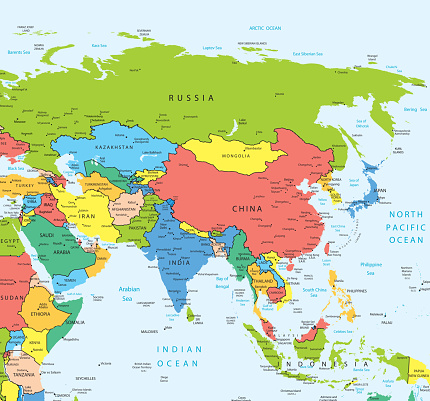In recent weeks India has captured international headlines for various reasons. The paramount of these have been its technology milestone of landing on the south pole of the moon. While the country has had a robust space programme for decades, the recent achievement has been a significant step amid global competition for space dominance.
The recent 2023 BRICS summit in Johannesburg, South Africa, also had India in the news. As the largest democracy and the second largest economy of the League of emerging economies, India’s presence was significant. Despite the impressive attention, the country has come a long way since independence.
India gained independence from Britain in 1947. That was 10 years before the first country in Sub-Saharan Africa, Ghana, gained independence from the European colonial power. Right from independence, the South Asian country faced internal conflicts and secession that emerged around religious and territorial questions. Pakistan and later, Bangladesh had been the result of the problem.
The British had colonised India in much the same way as they had done in their African colonies. Where there had been revolts, they had brutally suppressed it. Examples are the Sepoy rebellion in India, the 1948 riot in the Gold Coast, the Mau Mau rebellion of Kenya and many others across Africa. The road to India’s liberation had therefore been tumultuous in its early stages. Later, Mohandas Ghandhi’s nonviolent resistance was employed in the last stages towards independence.
Interestingly, India’s foremost liberator had developed his political and social views in Africa where he had moved in the late 19th century to practice law.
Geopolitically, India shares the Indian Ocean with Africa and other Asian countries. The long Indian Ocean coast of Africa and the important passageways for maritime traffic to Europe and the Americas make Africa “a” strategic partner to India. Technically, the coast stretches from Egypt (along the Red Sea) to Cape Agulhas in South Africa. This makes cooperation between India and Africa important.
Economically, India's relationship with Africa has been based on South-South cooperation. It is defined by the shared interest of two developing systems. India, together with Ghana and Egypt were among the pioneer states of the Non-Aligned Movement. Jawaharlal Nehru, Kwame Nkrumah and Abdul Gamal Nasser had helped create what was supposed to be the third option to the Cold War ideological dichotomy. Despite the Asian country's acquisition of nuclear arms in 1974, much had not changed.
Culturally, India and Africa, especially East Africa have had strong connections. Pre-colonial migration to the Indian Ocean Islands of Africa by Indians had established an earlier bond. Later, Britain as a colonial measure, had encouraged Indians to migrate to East Africa to take up jobs Africans were not skilled at the time. The grandparents of UK Prime Minister, Rishi Sunak belonged to the latter group.
Economically, India at independence had chosen socialism as the most suitable ideology for its development. Many African leaders like Nkrumah, Nyerere and Senghor had chosen socialism too. Ideologically, therefore, there had been a significant consonance between the South Asian federation and many states in Africa.
As an emerging economic power in the world and a member of the group of G22 groups of countries, India’s economic relations with developing African states seek partnership.
In recent decades, India has been active in the renewed interest in Africa by established and emerging powers. India has used mainly soft power to pursue its interests in many African countries. It has contributed troops in peacekeeping missions; supported infrastructural development; established cultural centres; and supported Indian firms to have a foothold in the continent. In the 2000s India built a Presidential Palace and other facilities for Ghana. As of 2019, India represented 6.4 per cent of the total external trade of Africa—worth some $62.6 billion.
The Modi government has stated that in its dealings with economies in the continent, India is focusing on trade, aid, agriculture, climate change and terrorism.
Despite these successes, India is still challenged on the continent for various reasons. These are; stiff competition from other emerging economies like China, Turkey, Brazil and Russia; and traditional external powers like France, the United Kingdom and the United States.
Security Issues:
India faces regional security threats emanating from territorial disputes with China and Pakistan. The latter has been decades-old conflicts that have resulted in several wars between the two states. The disputes with China, however, go beyond mere territorial contestation to an expected clash between two entities growing in military and economic might.
This notwithstanding, India has established some security cooperation with some African states. As mentioned, New Delhi seeks to prioritize cooperation with Africa in respect of rising violent extremism in the continent. Faced with domestic extremism of its own, India has the necessary experience to ensure consequential security cooperation in Africa. For decades, military facilities in India have been destinations for the training of elite military officers in many African countries.
In recent years Indian Ocean Island states including Seychelles, Comoros, Madagascar and Mauritius have seen tangible military cooperation.
Verdict:
Afro-Indian relations have been on an upward trajectory despite fierce competition from other global powers. Regardless, recent human right issues and problems with inclusiveness within India needs to be addressed as Africa seeks to consolidate its democratic gains in recent decades. As the largest democracy (in terms of population) in the world, India’s positive handling of its democratic system could be a good example for African states that seek to build democracies.
Economically, India could do more to increase trade between its economy and the rest of Africa. While global competition gets heated in the continent, New Delhi has more in common with Africa that could be capitalized to increase two-way trade. African states could also maximize the win-win approach to development as championed by New Delhi. Trade between Africa and India will continue to grow in the coming years.
